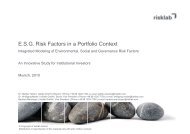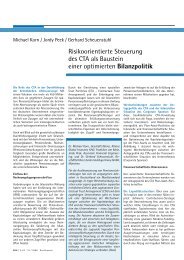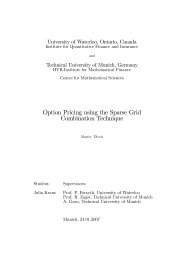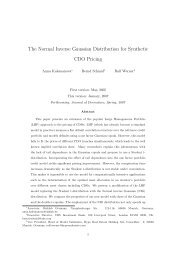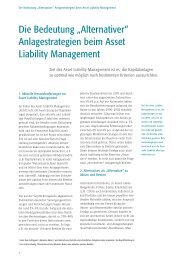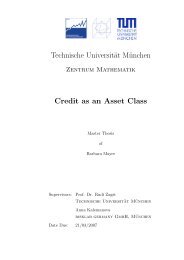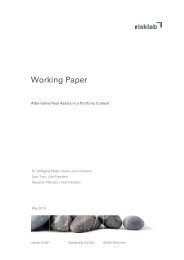Technical University Munich Commodities as an Asset Class - risklab
Technical University Munich Commodities as an Asset Class - risklab
Technical University Munich Commodities as an Asset Class - risklab
You also want an ePaper? Increase the reach of your titles
YUMPU automatically turns print PDFs into web optimized ePapers that Google loves.
2.3 Trading <strong>Commodities</strong><br />
2.3.1.3 Swaps<br />
Commodity swaps are generally the same like interest rate swaps 49 with the difference<br />
that the underlying payment streams are linked to the price movement of<br />
a commodity. A swap is <strong>an</strong> agreement between two parties to regularly exch<strong>an</strong>ge<br />
payments. The most common type is the fixed-for-floating commodity swap. The<br />
buyer of the swap pays at predefined usually equally spaced dates t 1 , . . . , t n a fixed<br />
price for a commodity times the notional <strong>an</strong>d receives from the seller of the swap<br />
the market value of the commodity times the notional. Hereby the notional is given<br />
in commodity units, e.g. tones of grain or barrels of oil. Figure 2.17 illustrates the<br />
exch<strong>an</strong>ge of payments at the oil market.<br />
Figure 2.17: Commodity Swap Payment Streams<br />
In order to hedge his cost structure a crude oil consumer such <strong>as</strong> <strong>an</strong> heating oil<br />
refiner enters into the described swap <strong>as</strong> the fixed leg, e.g. he is going to pay a fixed<br />
price for crude oil times the notional at predefined dates. Generally, he will expect<br />
oil prices to rise. On the other h<strong>an</strong>d of the swap st<strong>an</strong>ds the producer of oil, e.g. the<br />
oil extraction comp<strong>an</strong>y. It c<strong>an</strong> be expected that its fin<strong>an</strong>cial m<strong>an</strong>agement forec<strong>as</strong>ts a<br />
price decre<strong>as</strong>e <strong>an</strong>d w<strong>an</strong>ts to sell its product to a price fixed on the current high level.<br />
In vocabularies of c<strong>as</strong>h settlement e.g. he is going to pay the floating (respective<br />
market) price times the notional. Usually, just the net positions are c<strong>as</strong>h settled.<br />
Generally, <strong>as</strong> described under Section 2.2, producer <strong>an</strong>d consumer do not act directly<br />
with each other but traders m<strong>an</strong>age to bring the adequate parties together. We<br />
have seen that the side of the swap entered by a party depends on its expectation of<br />
ongoing price developments. Because m<strong>an</strong>y commodity swaps are c<strong>as</strong>h settled today,<br />
investors c<strong>an</strong> speculate on their expectation through entering into the respective side<br />
of a swap instead of entering into a series of the respective futures contracts. Out of<br />
the investors point of view <strong>an</strong> adv<strong>an</strong>tage of swaps is the long term orientation <strong>an</strong>d<br />
the absence of rolling maturing futures contracts.<br />
Swaps c<strong>an</strong> e<strong>as</strong>ily be used in structured products where the exch<strong>an</strong>ge of different<br />
49 For a general introduction to interest rate swaps see [Zagst 2002]<br />
37



